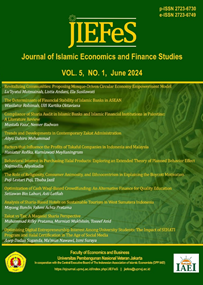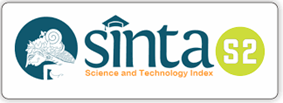Optimization of Cash Waqf-Based Crowdfunding: An Alternative Finance for Quality Education
DOI:
https://doi.org/10.47700/jiefes.v5i1.7918Keywords:
Cash Waqf, Crowdfunding, EducationAbstract
Education in Indonesia still has significant problems such as the lack of adequate learning facilities, the low quality of education, the high cost of education and the large number of students who drop out of school. The main problem of Indonesian education is the high cost of education, making it difficult for students with middle to lower economy to continue their education. Waqf as an Islamic philanthropy can be a solution to education financing, supported by the MUI Fatwa with the provision of waqf developed with sharia securities through crowdfunding platforms. The regulation of cash waqf through the MUI (Indonesian Ulema Council) Fatwa was developed following the times in Fatwa No. 140/DSN-MUI/VIII/2021 which explains waqf as one of the sharia securities as financing waqf. However, the collection of waqf funds for education financing is still not optimal. So, this research aims to provide an alternative to waqf as an Islamic social financing system that can develop the quality of education in Indonesia with the aim of SDGs (Sustainable Development Goals) in creating quality education. This research method uses library research method with literature study analysis through MUI fatwa approach. The results of this study explain the contract scheme that can make it easier for waqif to waqf through crowdfunding in the form of education financing investment, namely the wakalah bil istismar contract and the syirkah contract. However, crowdfunding for education financing is not widely applied for.
References
ALUDI. (2023). Anggota Asosiasi Layanan Urun Dana Indonesia. Aludi.Id. https://doi.org/https://aludi.id/index.php/core_home/selengkapnya_anggota.
Annur, C. M. (2022). Dana Securities Crowdfunding Tembus Rp507 Miliar per Juni 2022. Databoks. https://databoks.katadata.co.id/datapublish/2022/06/09/dana-securities-crowdfunding-tembus-rp507-miliar-per-juni-2022
Arab, S. H. Y., & Zakariyah, H. (2023). Waqf Funds for Higher Education in Malaysia and Bahrain: Drawing Lessons from the Experience. Milkiyah: Jurnal Hukum Ekonomi Syariah, Vol. 2 No.
Athahillah, & Suhendri. (2019). EDUCATION WAQF: AN ALTERNATIVE FINANCING OF ISLAMIC EDUCATION TODAY. Proceeding of International Conference on Islamic Educational Management, 107–115.
Azganin, H., Kassim, S., & Sa’ad, A. A. (2021). Proposed Waqf Crowdfunding Model for Small Farmers and The Required Parameters For Their Application. Islamic Economic Studies, Vol. 29 No.
Badan Pusat Statistik. (2023). Statistik Pendidikan 2023. Badan Pusat Statistik, 12, i–242.
Bappenas. (2020). Tingkatkan Pemerataan Pendidikan Berkualitas di Indonesia. Kementrian Perencanaan Pembangunan Nasional.
Chadha, D. (2023). School education | Here’s why it is important for students! ISchoolConnect.
Daniswara, F., & Rizal, N. S. (2017). Crowdfunding di Indonesia: Inovasi Mulia atau Kesempatan Bisnis. Faculty of Social and Political Sciences Universitas Gajah Mada.
Dewan Syariah Nasional MUI. (2019). Fatwa Dewan Syariah Nasional-Majelis Ulama Indonesia No 131/DSN-MUI/X/2019 Tentang Sukuk Wakaf. Dewan Syariah Nasional MUI, 131(X), 1–11.
El Daly, M. (2022). Al Waqf: Philanthropy, Endowments and Sustainable Social Development in Egypt. The Deutsche Nationalbibliothek.
Fisol, W. N. B. M., Haji-Othman, Y. Bin, & Saad, M. A. Bin. (2020). Privat Islamic University In Malaysia Towards A Waqf-Based University: The Sources of Waqf Higher Education Collection Using Fintech Crowdfunding Platfrom (CFP) Concepts.
Fitrian, R. (2017). Peran Pendidikan dalam Mewujudkan Indonesia Emas. Gema Cendikia.
Hartanto, S., & Sup, D. F. Am. (2022). Konsep Hybrid Contract di Indonesia dalam Perspektif Fatwa DSN-MUI. Journal of Islamic Economics and Finance Studies, Volume 3,.
Hasan, R., Hassan, M. K., & Rashid, M. (2019). The Role of Waqf in Educational Development – Evidence from Malaysia. Journal of Islamic Finance, 8(1), 1–7.
Hasanah, N. U., Ianovsky, D. G., & Uang, W. (2024). Studi Komparatif: Pengentasan Kemiskinan melalui ZIS dan Wakaf Uang. JESM: Jurnal Ekonomi Syariah Mualwarman, 3(1), 1–14.
Kementrian Agama Republik Indonesia. (2013). Panduan Pengelolaan Wakaf Tunai. Kementrian Agama Republik Indonesia.
Khairuddin, N. K., & Ishak, M. S. I. (2021). Waqf Based Crowdfunding For University Students: A Maqasidic Perspective. AL-MAQĀṢID The International Journal …, Vol. 2 No., 1–11.
KMENKO PMK. (2024). Dana Kuliah Bergulir untuk Mengejar Target APK Pendidikan Tinggi. KMENKO PMK.
Kompas.com. (2024). Menyoal 20 Persen Anggaran untuk Pendidikan. Kompas.Com.
Liang, L., Xie, J. X., Ren, J., Wang, J., & Wang, C. (2024). Does transparency facilitate the fundraising capacity of public welfare crowdfunding? An empirical examination on Weibo. Emerald.
Maghfira. (2019). Efektivitas kitabisa.com sebagai media crowdfunding dalam mendukung pertumbuhan wakaf sosial. UIN Alauiddin Makassar.
Mahfudz, A. A. (2021). P2P cash waqf crowdfunding platforms : The next frontier for Islamic philanthropy in Indonesia. Deloitte Indonesia Publications, February.
Majelis Ulama Indoensia. (n.d.). Fatwa DSN MUI No 14 Layanan Urun Dana (Islamic Securities Crowd Funding).
Mohiddin, M. N. (2021). Philanthropy Culture & Waqf Contribution For Islamic Education In Brunei Darussalam. Al-Qanatir: International Journal of Islamic Studies, 23(2), hlm. 2-19.
Muhammad, Rizqullah, M. F., & Suminto, A. (2023). WAQF-BASED SUSTAINABLE EDUCATION INSTITUTION MODEL ; A SOLUTION TO EVERY EDUCATIONAL INSTITUTION PROBLEM. Tathwir, Jurnal Pengembangan Masyarakat Islam, XIV, 151–164.
Muhammad, U. A. (2023). Crowdfunding Waqf Melalui Platfrom Wakaf Kita Untuk Proyeksi Infrastruktur Pendidikan (Studi Kasus Penghimpunan Wakaf Uang Pada Lembaga Wakaf Kita Yayasan Ats Tsaqofah Kabupaten Jombang). UIN Sayyid Ali Rahmatullah Tulungagung.
Mujani, W. K. (2021). Waqf for Higher Education in Malaysia : Overview on Challenges. European Journal of Multidisciplinary Studies, 8385(June), 131–140.
Mukharrom, T., Indriani, T. F., Syibly, M. R., Inayah, S., & Dewantoro, H. (2022). Action Review of Sustainable Development Goals (SDGs) on The Framework for Development of Waqf at Universitas Islam Indonesia. The 3rd International Conference on Advance & Scientific Innovation (ICASI).
Murtado, D. (2024). Menag Apresiasi BWI Kembangkan Wakaf Produktif. Kementrian Agama Reoublik Indonesia.
Nasution, A. D., & Medias, F. (2020). Waqf Financing Model Through Crowdfunding Platform: An Indonesian Perspective. 1st Borobudur International Symposium on Humanities, Economics and Social Science.
Newsunair. (2022). Peran Wakaf untuk Pengembangan Pendidikan. Unair News.
None. (2024). Education Waqf share. International Waqf Fund.
Nugraha, A. L., Susilo, A., Huda, M., Athoillah, M. A., & Rochman, C. (2022). Waqf Literacy: The Dynamics of Waqf in Indonesia. Journal of Islamic Economics and Finance Studies, Volume 3,.
Permana, B. S., Insani, G. N., Reygita, H., Rustini, T., Indonesia, U. P., City, B., & Province, W. J. (2023). Lack of Educational Facilities and Infrastructure in Indonesia. Aurelia: Jurnal Penelitian Dan Pengabdian Masyarakat Indonesia, 2(2), 1076–1080.
Ramadhan, M. N. P. (2023). Hasanuddin Journal of Strategic The Role of SDG 4 : Quality Education on the Internationalization. HASANUDDIN JOURNAL OF STRATEGIC AND INTERNATIONAL STUDIES, 1394, 39–51. https://doi.org/10.20956/hjsis.v1i2.27442
Ramdania, S., Achyar, M., Ali, R. A., & Nisa, A. (2022). MODUL PELATIHAN SECURITIES CROWDFUNDING (SCF) (1st ed.). Komite Nasional EKonomi dan Keuangan Syariah (KNEKS).
Rasyidah, W., Musa, W., Saladin, M., Rasool, A., Sara, S., Rasyidah, W., Musa, W., Saladin, M., Rasool, A., & Ibrahim, S. S. (2021). The Role of Intangible Resources for Waqf in Higher Education : A Conceptual Review The Role of Intangible Resources for Waqf in Higher Education : A Conceptual Review. International Journal of Academic Research in Business and Social Sciences, 1(10). https://doi.org/10.6007/IJARBSS/v11-i10/11512
Rizaty, M. A. (2024). Data Persentase Pemuda Menurut Pendidikan pada 2023. DataIndonesia.Id. https://dataindonesia-id.translate.goog/varia/detail/data-persentase-pemuda-menurut-pendidikan-pada-2023?_x_tr_sl=id&_x_tr_tl=en&_x_tr_hl=en&_x_tr_pto=sc&_x_tr_hist=true
Rusydiana, A. S., Education, Q., & Syariah, M. (2023). Alternative Waqf Model for SDG-4 ( Quality Education ). SMART Indonesia, 2(2).
Setyaningrum, D., Wardhani, R., & Agustina, N. (2021). The Fulfillment of the Quality Education in Indonesia based on Sustainable Development Goals Indicators. Review of Integrative Business and Economics Research, 10(3), 35–42.
Suhendar, F. A. (2024). The Impact of Poverty on Education. Jurnal Ilmu Sosial Dan Pendidikan (JISIP), 8(2), 39–47. https://doi.org/10.1007/978-3-319-22807-5_4
Sulistiani, S. L., Fawzi, R., & Nurrachmi, I. (2023). Waqf Crowdfunding Model in Post-Pandemic Economic Improvement According to Islamic Sharia and National Law. Amwaluna: Jurnal Ekonomi Dan Keuangan Syariah, Vol. 7 No.
Syahidah, W. (2023). Buruknya Akses Pendidikan di Indonesia. Jurnal Post.
Syamsuri, Kurniawan, M. I., & Arti, D. K. (2023). CROWDFUNDING WAKAF DI TINJAU DARI MAQASHID SYARIAH MENURUT IMAM SYATIBI. El_Iqtishady: Jurnal Hukum Ekonomi Syariah.
Umam, K., Mahmudi, L. N., Shahruddin, A. Bin, Roslan, I. A., & Faratama, A. Z. (2023). Darussalam Gontor Waqf Models Based on Local Wisdom in Creating Inclusive and Quality Education. Proceedings of the Conference on SDGs Transformation through the Creative Economy: Encouraging Innovation and Sustainability.
Waluyo, D. (2024). Otak-atik Skema Pembiayaan Pendidikan. Indonesia.Go.Id Portal Informasi Indonesia.
Yusro, M. (2023). Peringkat Sistem Pendidikan Dunia 2023, Indoensia Ke 67 dari 203 Negara. WordPress.
Zawawi, Yasin, Y., & Helmy, M. I. (2023). Waqf and sustainable development law: models of waqf institutions in the Kingdom of Saudi Arabia and Indonesia. Ijtihad : Jurnal Wacana Hukum Islam Dan Kemanusiaan, Vol. 23 No.
Downloads
Published
Issue
Section
License
Copyright (c) 2024 Setiawan Bin Lahuri, Asti Lutfiah

This work is licensed under a Creative Commons Attribution 4.0 International License.
Authors who publish with this journal agree to the following terms:
- Authors retain copyright and grant the journal right of first publication with the work simultaneously licensed under a Creative Commons Attribution 4.0 International License that allows others to share the work with an acknowledgment of the work's authorship and initial publication in this journal.
- Authors can enter into separate, additional contractual arrangements for the non-exclusive distribution of the journal's published version of the work (e.g., post it to an institutional repository or publish it in a book), with an acknowledgment of its initial publication in this journal.
- Authors are permitted and encouraged to post their work online (e.g., in institutional repositories or on their website) before and during the submission process, as it can lead to productive exchanges, as well as earlier and greater citation of published work.

This work is licensed under a Creative Commons Attribution 4.0 International License.











